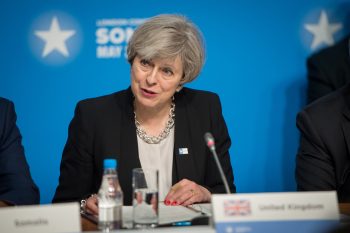
April 19, 2018 • Opinion •
Despite the bombing of chemical weapon sites in Syria, along with France and the US, and the recent show of support from Western allies in the Skripal affair, Britain’s international clout will inexorably erode after Brexit, writes Pierre-Alain Coffinier, Research Fellow at the Thomas More Institute, former Consul General for France in Scotland, author of the report « Brexit: What impact on British global power?«
By taking part alongside the United States and France in the bombing of chemical weapons sites in Syria, the United Kingdom declared its intention to uphold its role as a global military power after Brexit. By supporting London in the Skripal affair against Russia, the Western allies unanimously expressed their readiness to maintain a full cooperation with the British, Brexit notwithstanding.
But will this be enough for the UK to maintain the role it has brilliantly withheld since World War 2? How will such a dramatic change in its relations to its closest neighbours and allies affect its position? So far the UK has been extraordinarily successful in projecting its strength around the globe, punching much above its weight in influencing the world through the might of the City of London, its armed forces, influence in Brussels, that of its global media, the BBC, its press, its global ranking universities, research, sports…
But global influence today is about more than military power and diplomacy. The capacity of projecting one’s economy, of steering your peers in international organisations, especially the European Union, of influencing intellectually, culturally through all means of soft power count just as much.
Brexit started two years ago. So far, in the negotiation phase, the damage has been limited though real. Tomorrow, without predicting the exact destination, all scenarios bear risks, be it a soft Brexit in the European Economic Area or the European Customs Union, a hard Brexit out of both, linked to the EU by a free trade agreement, or no particular text at all beyond the rules of World Trade Organisation. No solution surely enhances the global standing of the UK.
In a recent study, Thomas More Institute reviewed the five pillars of British power in the 21st Century: the capacity of influencing the EU itself, the only entity capable of standing up to such powers as the United States, China or Russia, the global economy, the military might, global diplomacy and softpower through the different phases or scenarios of Brexit.
Theresa May acknowledged that « Although we (the British) will lose some elements of the force multiplier advantages of EU membership, we will gain more flexibility and agility to react, and our foreign policy capability broadly drawn will ensure we are one of the major global players as now”. But will they?
Whatever the formula, leaving the EU means London loses all clout in Brussels. Already during the negotiation phase, the British are out of all discussions about their own departure, the future of the EU. The so far united 27 impose everything on them, forcing London to yield, for instance on the transition phase: on the migrants, the Irish border, fishing rights, the European legislation and the ECJ… By remaining in the European Economic Areas, like Norway, the UK would not be better off. Becoming a rule-taker rather than a rule-maker, it would have no say in the definition of the European legislation, which greatly matters for its major industries, such as pharmaceuticals, chemicals, cars… Further apart in the European Customs Union only, the UK would regain control on EU migrants, but have no say on free trade agreements with third countries she would have to abide to. Such a disadvantageous situation for its industries has been discarded as a “vassalisation”. Not to speak of its services, which account for 60% of all British exports, for which there is no hope of keeping the open access they enjoy today to the 510 million consumers market of the EEA.
Globally nothing Is straightforward as London discovers it counts for all major third players, the United States, Japan, China or the Commonwealth countries, because it is in the EU, as a gateway. No new bonds can be tied before knowing its final destination with the EU.
Economically the British Government themselves have reported that whatever the scenario, the UK is bound to lose in terms of growth, by around 1.6% in the coming 15 years in a soft Brexit in the European Economic Area, at least around 4.4% linked with a free trade agreement with Brussels, but up to at least 7.7% in a no deal scenario. No doubt such uncertainty would further erode an already very stretched military budget.
Strategically, no doubt as we see today that both shores of the Channel are interested in maintaining the closest cooperation on external security and defence matters. But being out is out: London would no longer be around the table in Brussels and able to drag the smaller member states around its positions like just Germany or France can do today. What kind of nimbleness or margin of maneuver would she gain? It is hard imagining the UK “aligning” with the 27, in as much as taking an opposite direction or even abstaining repeatedly.
Even though it seems improbable today, an unmastered Brexit could rekindle the strife in Northern Ireland or the secessionist dreams in Scotland. Should it lead to an independent Scotland, the British nuclear deterrent, which is fully based north of Glasgow on possible foreign territory, could no longer be assumed a long future.
Should the UK finally decide to back down and remain in the EU, their position as one of the 3 “big ones” today, would have to be rebuilt. The profoundly divided opinion of today would have to be reconciled around an EU project. The current opt-outs carved out by London would be seen differently in Brussels and no longer be accepted as conditions for keeping London anchored to the Continent, whereas Europe might have in the meantime taken a direction – in defence for instance – opposite to British traditional views.
So far the Brexit referendum seems to have unleashed a host of bad winds to the global ambitions of an increasingly inward looking United Kingdom entangled in impossible political equations.

